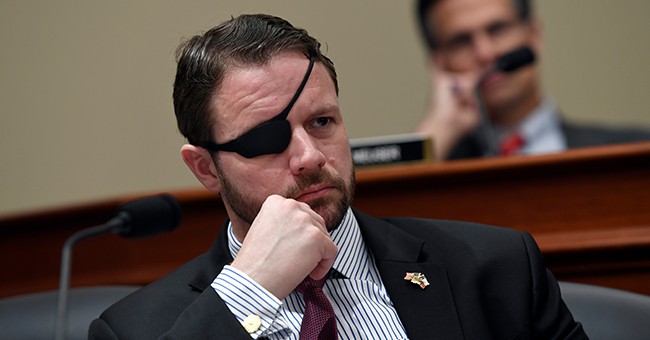
Rep. Dan Crenshaw, R-Texas, left, listens as Office of Management and Budget Acting Director Russell Vought testifies before the House Budget Committee on Capitol Hill in Washington, Tuesday, March 12, 2019, during a hearing on the fiscal year 2020 budget. (AP Photo/Susan Walsh)
With President Trump signing the Wuhan Virus relief bill into law this afternoon, tensions are running high among some on the right.
Part of that was stoked by Rep. Thomas Massie, who attempted to force an in person vote this morning instead of allow unanimous consent to take place. While you can certainly argue Massie’s beliefs on the bill’s multitude of flaws are genuine, others feel it wasn’t the time to pull such a stunt given the very real risks to people’s lives. There were other ways he could have voiced his displeasure.
One of those taking Massie’s side was former Republican Justin Amash. He led with this tweet on the matter.
Just ten years after the Tea Party movement, Republicans in Congress are defending a $500 billion corporate welfare fund for a select group of large companies.
— Justin Amash (@justinamash) March 26, 2020
If you aren’t familiar with Amash, he’s the same Congressperson who has been stumping to impeach Trump for years and has relentlessly virtue signaled about it. I covered some of his rantings in this linked article if you want a taste of what that was like.
Rep. Dan Crenshaw took issue with Amash’s post and responded.
Sloganeering is a convenient mental shortcut, but it’s not the same as actually thinking through the policy.
This is not “corporate welfare” for poorly performing industries. These are great American companies that were told to stop doing business and taking in revenue. https://t.co/7mbqMps67V
— Dan Crenshaw (@DanCrenshawTX) March 27, 2020
Crenshaw is right. Disagree with the bill, but trying to paint this as a bailout is nonsense. These companies were forced to shut down by the government, which makes this much more akin to an eminent domain claim. None of the current hardship is due to companies making bad loans or doing bad business, i.e. as in the 2008 financial crisis.
Further, everyone agrees that something has to give here as far as help or the entire economy could go into a depression. At that point, tax receipts collapse and it would likely produce more government debt in that situation. Amash trying to frame this as a tea party issue while lying about what’s in the bill is not a good look.
Amash responded again with this.
Ah, yes. I’d forgotten these are *great* American companies. The millions of American companies facing the same plight that won’t be getting money from this fund must not be great, right? That would explain the different treatment. You’re good at thinking through the policy. https://t.co/b6XQhyRiVL
— Justin Amash (@justinamash) March 27, 2020
As Crenshaw points out, Amash’s characterization is misleading at best.
This would be a good point, if it were true.
This bill helps businesses of all sizes, and smaller businesses especially. Small business loans get FORGIVEN. We’re helping businesses keep Americans employed.
You’re lying to get attention, and you know it. https://t.co/W0sN5KuahY
— Dan Crenshaw (@DanCrenshawTX) March 27, 2020
At the time of writing this, that’s where the argument ended.
Look, there are reasons to not like this bill. The vote by mail stipulations are especially troubling (though perhaps necessary if we can’t have in person voting everywhere in November). There are obviously some stupid payoffs as well, such as the Kennedy Center getting $25 million. If someone wants to argue on those lines, I’m all for that.
What I’m not for is disingenuous framing in order for one to signal their own supposed superiority. Amash has a long history of that, with his impeachment follies just being the latest example. Crenshaw apparently had heard enough and decided it was time to take the issue public. I can’t fault him for that.















Join the conversation as a VIP Member